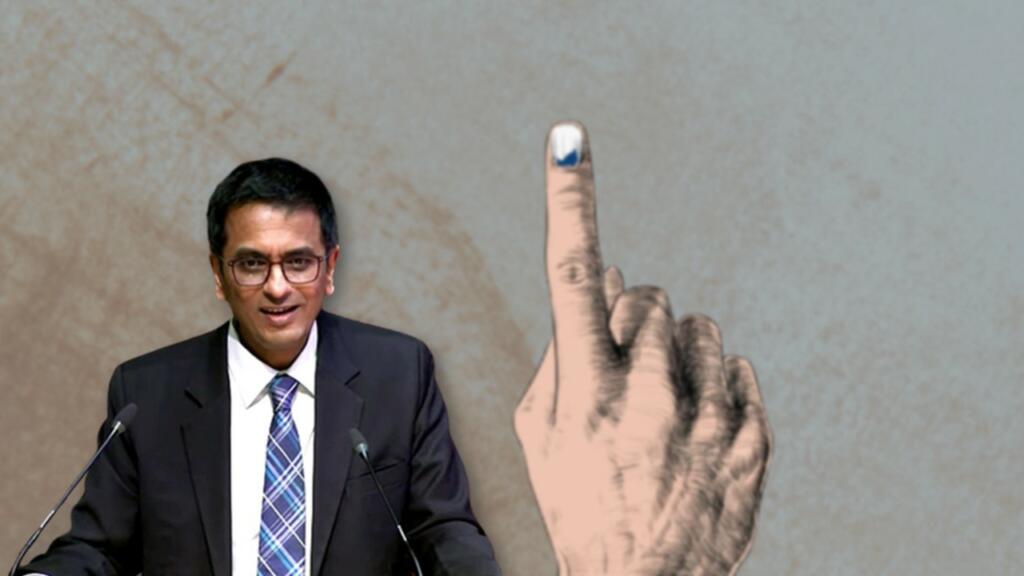The privilege of enfranchisement is deemed to be the quintessential and paramount right in India as a participatory democracy. The act of casting one’s vote is a manifestation of our loyalty to ourselves, our fellow citizens, and our nation. The act of voting serves as the bedrock of political involvement and is acknowledged as a universal prerogative, pivotal to the democratic system. In India, the right to vote is perceived as a hallmark of equality.
Debate over Right to Vote: Constitutional Guarantee or Statutory Provision?
The recent observation of Chief Justice of India (CJI) DY Chandrachud has once again fuelled the debate over the legal position of ‘Right to Vote’ in India. The observation of the Apex Court was made while adjudicating a Public Interest Litigation (PIL) questioning the constitutionality of Section 33(7) of the Representation of Peoples Act 1951.
Deviating from the prominent issue, CJI Chandrachud expressed doubts about the view that the right to vote was ‘not’ merely a statutory right. The petitioner, Senior Advocate Gopal Sankaranarayanan, argued that Section 33(7) of the Representation of Peoples Act 1951 was restrictive in nature and that restrictions must be reasonable under Article 19 of the Constitution.
Also read: The legal fallout of Shanti Bhushan’s legacy
To which CJI Chandrachud responded by saying, “It is not a restriction, it’s a facilitative measure…There are some judgments that say that the Right to Vote is only a statutory right and not a constitutional right. But no, it is a constitutional right because it is covered under the purview of Article 19(1) (a), i.e., the right of expression, the right of people to elect, and for people to vote.” However, he did not elaborate further on this point as it was not relevant to the current case.
Earlier, Justice KM Joseph, while heading a Constitution Bench had also disagreed with the Election Commission of India’s stance that the right to vote was merely a statutory right and not a constitutional right.
Also read: Love, Lies and Consent: The Marital Promise Conundrum
Tempestuous Sea of Confusion: Supreme Court’s Stance on Right to Vote in India
The right to vote is provided under the purview of Article 326 of the Indian Constitution. A liberal interpretation of Article 326 provides that the elections to the House of the People and to the Legislative Assembly of every State shall be on the basis of adult suffrage, which means every adult citizen of India has the right to vote.
However, the right to vote is explicitly provided under the provisions of the Representation of the People Act, 1951 that incorporate the statutory framework for the conduct of elections in India and also reinforce the constitutional right to vote.
In several landmark cases, the Supreme Court of India has upheld the significance of the right to vote as a fundamental right. In the case of Unnikrishnan v. State of Andhra Pradesh, the Supreme Court held that the right to vote is a constitutional right and any restriction on the right must pass the test of reasonableness and must be in the interests of the general public.
Also read: POCSO’s implementation is patriarchal and has become a curse for teenage boys
Interestingly, the recent observation of the CJI has provided a more diverse perspective to the scheme of things by providing ‘right to vote’ as an extension to the ‘right of expression’. In conclusion, the right to vote in India is both a constitutional right as well as a statutory right, and the Supreme Court of India has consistently upheld its importance as a fundamental right. However, a more explicit pronouncement on the matter is still awaited.
Support TFI:
Support us to strengthen the ‘Right’ ideology of cultural nationalism by purchasing the best quality garments from TFI-STORE.COM
Also Watch:
https://www.youtube.com/watch?v=VCwoz9WJIok
